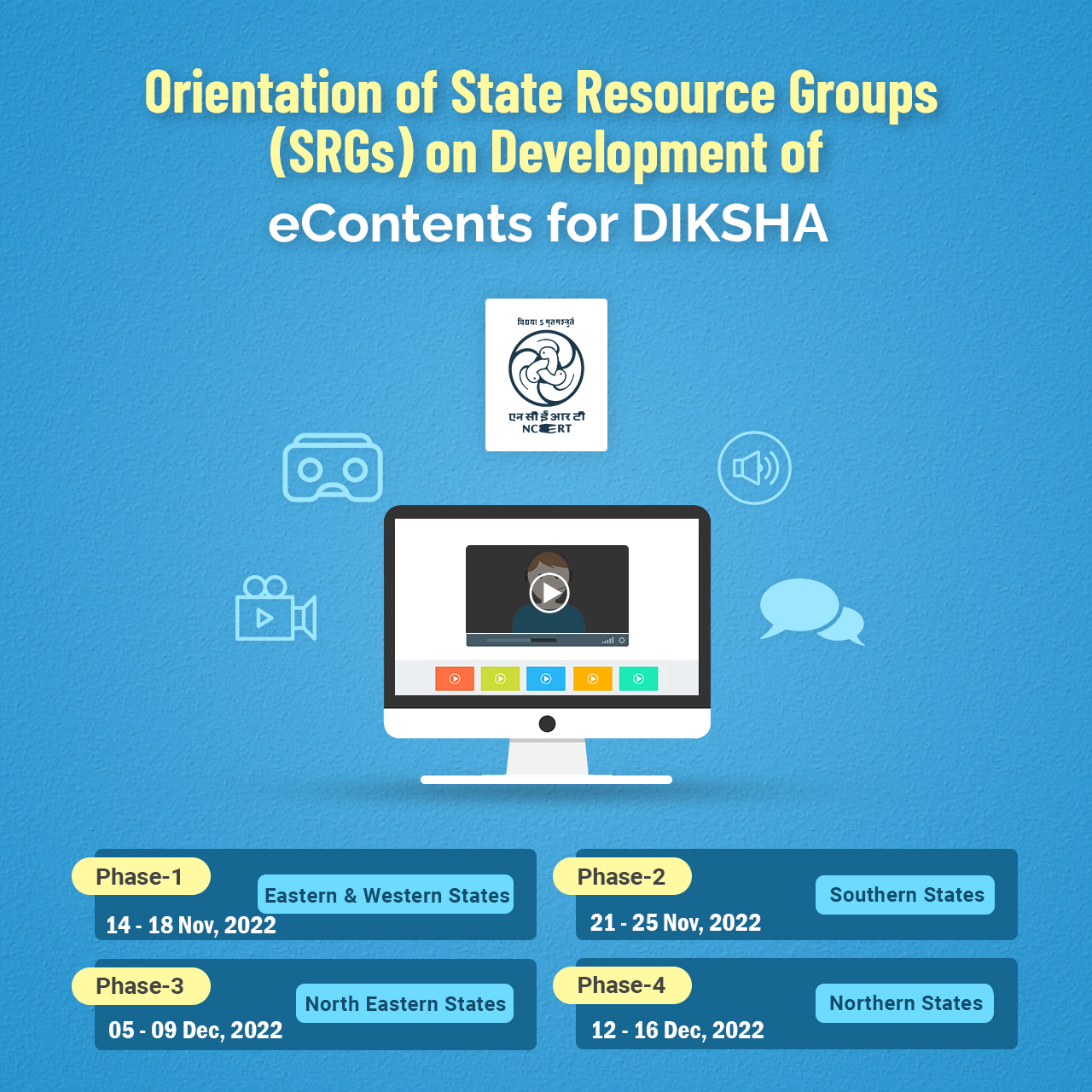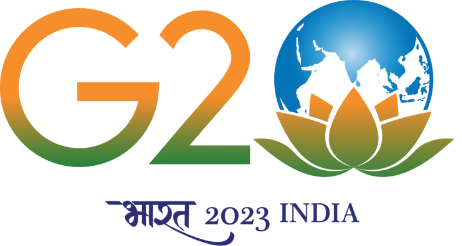
Orientation of State Resource Groups (SRGs)
on
Development of
eContents for 2022-23
 Government of India has brought in several initiatives for dissemination of eContent such as DIKSHA (One Nation One Platform), PMeVIDYA (One Class One Channel), MOOCs on SWAYAM, ePathshala, etc and DIKSHA has been sought as a one stop solution for School Education. The Ministry of Education has launched NIPUN Bharat Mission for Foundational Literacy and Numeracy (FLN), Education for All (Adult Education) and Virtual Labs as special verticals on the DIKSHA platform. Besides, several other verticals i.e. DIVYANG/ CWSN, CPD for educating educators, administrators, vocational education etc are also being created on DIKSHA portal. These verticals aim to nurture skills, special abilities and help increase the quality of life of an individual by enabling them to pursue their livelihood, be aware of their rights and responsibilities.
Government of India has brought in several initiatives for dissemination of eContent such as DIKSHA (One Nation One Platform), PMeVIDYA (One Class One Channel), MOOCs on SWAYAM, ePathshala, etc and DIKSHA has been sought as a one stop solution for School Education. The Ministry of Education has launched NIPUN Bharat Mission for Foundational Literacy and Numeracy (FLN), Education for All (Adult Education) and Virtual Labs as special verticals on the DIKSHA platform. Besides, several other verticals i.e. DIVYANG/ CWSN, CPD for educating educators, administrators, vocational education etc are also being created on DIKSHA portal. These verticals aim to nurture skills, special abilities and help increase the quality of life of an individual by enabling them to pursue their livelihood, be aware of their rights and responsibilities.
The Foundational Literacy and Numeracy (FLN) has been sought as a solution towards achieving basic foundational skills of reading with comprehension, writing and doing basic operations of mathematics as it focuses on the importance of early learning/ early childhood education programmes. The vision of the document emphasises that children learn in a joyful manner through play, stories, rhymes, activities, local art, craft and music and develop strong foundations for lifelong learning. The NIPUN Bharat mission outlines learning outcomes for FLN which have been designed in a spiral and progressive manner from Preschool to grade three aiming at holistic development and learning.
The Adult Education vertical viewed pursuing a livelihood as basic rights of every citizen and to achieve the same this vertical provides the opportunity to attain foundational literacy, and obtain an education. Literacy and basic education open up whole new worlds of personal, civic, economic, and lifelong-learning opportunities for individuals that enable them to progress personally and professionally. The cell for National Center for Literacy through Adult Education and Continuing Learning, NCERT aims to increase the quality of life of an individual by enabling them to pursue their livelihood, and being aware of their rights and responsibilities by imparting foundational literacy and numeracy, critical life skills including financial literacy, legal literacy, digital literacy, health and awareness and so on.
Experiments or laboratory work are vital for learners. They are useful in understanding the theories and concepts of science or other subjects that cannot be studied alone only by textbooks. The virtual labs are based on the idea that lab experiments can be taught using the Internet, more efficiently and less expensively. The labs can also be made available to students with no access to physical labs or where equipment is not available owing to being scarce or costly. This helps them compete with students in better equipped schools and bridges the digital divide and geographical distances. The experiments can be accessed anytime and anywhere, overcoming the constraints on time felt when having access to the physical lab for only a short period of time.
The National Education Policy - 2020 (NEP- 2020), unveiled by the Ministry of Education emphasises for the development of quality eContent in varied forms in all regional languages to feed into the FLN and Adult Education vertical on DIKSHA for a diverse group of learners including DIVYANG and to empower students and teacher communities across India. eContent augments the learning experience by deploying various resources for visualisation and explanation of abstract ideas. Keeping in view the diverse needs of learners, now use of eContent has become an essential component of the teaching and learning processes. eContent is available in large numbers through various sources, but few of them are found to have the desired quality in terms of content, pedagogy as well as technical aspects. Copyright violations are rampant thereby restricting the scope of customising the eContent according to the local needs. Also with a plethora of smart and mobile devices, teacher and student driven eContents are available in abundance in the market.
NEP -2020 further emphasises on development of eContent by NCERT-CIET, CBSE, NIOS, and other bodies/ institutions, which will be uploaded on to the DIKSHA platform and also use the platform for teacher professional development. eContents have to be created for DIKSHA and its verticals on FLN, Adult Education, Virtual Labs, Vocational Education and CWSN based on the quality parameters and learning outcomes.
NEP-2020 also puts emphasis that each teacher and school principals will be expected to participate in at least 50 hours per annum Continuous Professional Development (CPD) activities. Therefore, CIET- NCERT planned a series of virtual training programmes to familiarise the SRGs on development of eContent, process of developing quality eContent and curation of eContent and its dissemination through multiple modes -online/ offline/ on air/ web portals /apps etc and contribute in bridging the digital divide.
Objectives of the Programme:
The objectives of these five orientation programmes are to:
- Sensitize the stakeholders on Digital Education Initiatives taken up by the Ministry of Education-Govt of India and CIET-NCERT.
- Familiarise the process of eContent development.
- Support creating a variety of eContent (audios, videos, interactions, quizzes, AR, VR, Virtual Labs etc).
- Familiarise various FOSS tools associated with development of eContent.
- Acquaint with quality parameters in relation with metadata standards in the process of curation, licensing, cyber safety & security in development.
- Sharing of best practices.
Training Calendar
| Phase(s) | Coverage of States/ UTs | Dates |
|---|---|---|
| Phase 1 |
Bihar, Chhattisgarh, Goa, Jharkhand, Madhya Pradesh, Maharashtra, Odisha, West Bengal and UTs of Dadra, Nagar Haveli, Daman and Diu. |
14-18 Nov, 2022 |
| Phase 2 |
Andhra Pradesh, Karnataka, Kerala, Tamil Nadu, Telangana and Union Territories of Pondicherry, Ladakh, Lakshadweep and Andaman and Nicobar Islands. | 21-25 Nov, 2022 |
| Phase 3 | Assam, Arunachal Pradesh, Manipur, Meghalaya, Mizoram, Nagaland, Sikkim and Tripura. | 05-09 Dec, 2022 |
| Phase 4 | Haryana, Gujarat, Himachal Pradesh, Punjab, Rajasthan, Uttarakhand, Uttar Pradesh, the National Capital Territory of Delhi and the Union Territory of Chandigarh, Jammu & Kashmir. | 12-16 Dec, 2022 |
Project/ Course Organising Team:
Course Director - Prof. Amarendra P. Behera, JD, CIET-NCERT
Programme Coordinator - Prof. Indu Kumar
CPD Methods and Approaches - Demonstrations, discussions and Handson Sessions will be conducted for bringing familiarity with the applications and softwares. Quizzes shall also be used for checking the understanding of the participants.
Continuous Professional Development Resources - Powerpoint presentations, Demonstration video or video tutorials shall be shared to overcome the connectivity issues during the sessions.
CPD Resource Team - Prof. Indu Kumar, Dr. Angel Rathnabai, Dr. Rejaul K Barbhuiya, Dr. Monica Nagpal, Dr. Prachi Sharma, Dr. Deepty, Dr. Nidhi Singh, Dr. Gulshan Mufeed, Ms Priyakshi Gupta, Ms. Chinty, Dr. Yash Paul Sharma and External experts have been identified for the sessions.
Contact Person - Dr. Indu Kumar & Dr. Monica Nagpal.
Programme Schedule
| Date & Day | 09:30 am - 11:15 am | 11:30 am - 01:00 pm | 02:00 pm – 03:00 pm 03.00 pm - 03.30 pm |
03:45 pm – 05:15 pm |
|---|---|---|---|---|
| Day 1 Monday | Session 1 | Session 2 | Session 3 | Session 4 |
Registration 09.30 - 10.00 am |
Digital Resources for Teaching, Learning & Assessment- Types & Formats(With special ref to: FLN & Adult Education Resources) Prof. Indu Kumar - Programme Coordinator |
Accessible Digital Resources OER and Licences - OER Course |
Instructional Designing with an emphasis on script writing and storyboarding |
|
| Day 2 Tuesday | Session 5 | Session 6 | Session 7 | Session 8 |
Graphic Resources I- Concept, Purpose, Type, Development Process and Hands On |
Graphic Resources II- Concept, Purpose, Type, Development Process and Hands On Dr. Gulshan Mufeed |
Interactive Resources- Concept, Purpose, Type, Development & Dissemination Process |
Developing Interactives H5P Hands on |
|
| Day 3 Wednesday | Session 9 | Session 10 | Session 11 | Session 12 |
Audio Resources - Concept, Purpose, Type and Development Process Ms. Vandana Arimardan/Mr. Ajit Horo/ Ms. Vimlesh Chaudhary |
Audio Resources Hands On Mr. Ajit Horo |
Video Resources - Concept, Purpose, Type and Development Process - Hands on Dr. Monica Nagpal |
Virtual Labs on DIKSHA: Concept, Purpose, Type, Development and Dissemination Process |
|
| Day 4 Thursday | Session 13 | Session 14 | Session 15 | Session 16 |
Animation Resources - Concept, Purpose, Types and Development |
Developing Animation resources Hands on - Stop Motion Animation Dr. Prachi Sharma |
Subject Specific Tools (AR, VR) Social Sci: Dr. Nidhi S Chemistry: Dr. Ajita D Physics: Ms. Chinty Biology: Dr. Yash Paul Maths: Dr. B Madhu Languages: Ms. Priyakshi |
Evaluation of eContent Prof. Indu Kumar/ Dr. Monica Nagpal |
|
| Day 5 Friday |
Session 17 | Session 18 | Session 19 | Session 20 |
Content Pedagogy & Technology Integration Dr. Angel Rathnabai |
11.30am - 12.15 pm Understanding ebooks types and possibilities 12.15 pm - 01.00 pm
Action Plans for 2023-24
Econtent development plans to be designed by each state/UT |
Cyber Safety and Security Cyber Peace Foundation |
Presentation of state Action Plans
Feedback |






